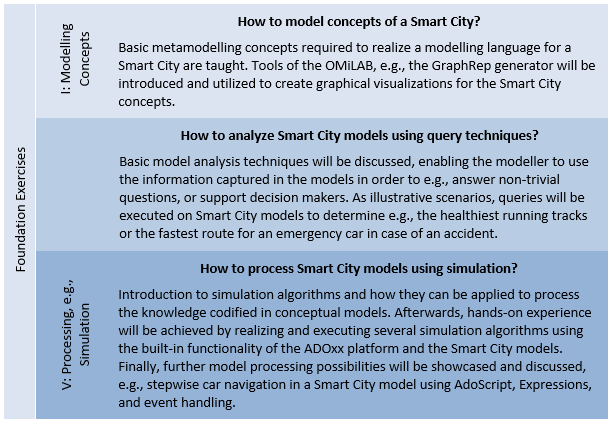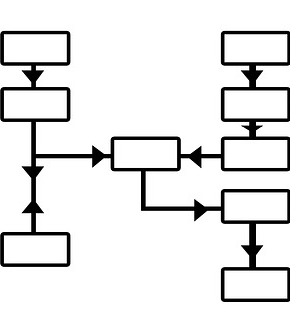The upcoming of technologies in the context of Internet of Things (IoT) such as ubiquitous sensors, mobile devices, and permanent online interaction has recently also been adopted for the area of urban development. Thereby, the transition towards user-driven digital ecosystems in the form of Smart Cities becomes apparent on three levels: a.) innovation economy, b.) city infrastructure and utilities, and c.) governance (Schaffers et al., 2011)1. In this exercise series we will primarily focus on the aspects of the city infrastructure and the utilities. This will be a key element in realizing services such as smart parking, mobility, or the monitoring of the environment in terms of real-time alerts and safety management.
In particular, the increasing usage of IoT technology in smart vehicles, smart infrastructure and smart phones allows developing new business models and services. Based on the tremendous amount of information that is generated every second by sensors in a smart environment, innovative applications such as services for environmental and energy monitoring, services for the prediction of mobility requirements, smart meters for measuring resource consumption, or medical surveillance and assistance for elderly peoples can be realized (Hernández-Muñoz et al., 2011)2.

In this context three foundation exercises have been designed to familiarize the students with modeling concepts, model querying and model processing in an independent application domain.
In three sessions, an introduction to the foundations of metamodeling, model analysis & querying, and model processing through simulation & algorithms is given. Every session comprises theoretical background, a demonstration using the Smart City scenario, and hands-on parts by means of practical implementation using the ADOxx metamodeling platform. The goal of the exercises is to show the power of meta modelling and conceptual modelling in answering the requirements of upcoming domains that cannot be addressed with general-purpose modelling languages.
Session I: Smart City Modelling
In the first session, students will be introduced to the Smart City as an application domain for conceptual modelling. They will also get familiar with the ADOxx meta modelling platform. Based on a predefined Smart City Library, the NEMO students will learn how to create new modelling classes and new relation classes. Moreover, students will create graphical representations of the new classes in ADOxx in two ways: First, a static graphical representation will be realized. Second, students will learn how to realize an attribute-dependent visualization for Smart City classes in ADOxx.
Finally, the students will use the ADOxx Modelling Toolkit to create new Smart City models that also incorporate the introduced modelling and relation classes. Figure 1 illustrates the overall structure of the first exercise session.

Session II: Smart City Analysis
In the second session, students will use predefined models and the ADOxx model querying functionality in order to answer non-trivial questions related to multiple scenarios within a Smart City, e.g., Emergency Management, Running Track Search, Accident Management, Smart Parking, or Marathon Management.
In order to solve these tasks, students will get familiar with ADOxx standard queries, predefined queries, and the combination of queries. Figure 2 illustrates an overview of all tasks related to the second exercise session.

Session III: Smart City Simulation
The third session targets model simulation. Students will user predefined dynamic and static Smart City models and use the ADOxx simulation functionality to solve complex scenarios. All scenarios are related to the Smart City. More specifically, the simulation scenarios center a marathon that shall be planned.
Figure 3 illustrates some questions the students will answer using path analysis, workload analysis, and capacity analysis.

Download exercise slides I here
Download exercise slides II here
Download exercise slides III here
1 Schaffers et al. (2011): Smart Cities and the Future Internet: Towards Cooperation Frameworks for Open Innovation, in: J. Domingue et al. (Eds.): Future Internet Assembly, pp. 431–446, Springer.
2 Hernández-Muñoz, J.M. et al. (2011): Smart Cities at the Forefront of the Future Internet, in: J. Domingue et al. (Eds.): Future Internet Assembly, pp. 447–462, Springer.




